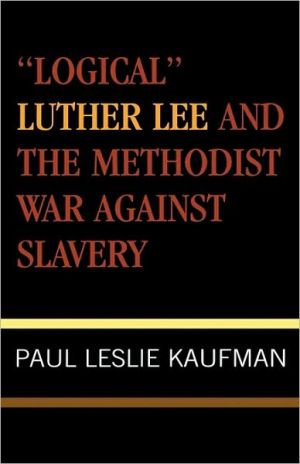

 |

|

The average rating for Logical Luther Lee And The Methodist War Against Slavery based on 2 reviews is 3.5 stars.
Review # 1 was written on 2013-01-31 00:00:00 Tiffany Jennings Tiffany Jennings[image error] |
Review # 2 was written on 2019-07-19 00:00:00 Sandra Stillwell Sandra StillwellThe issue of secession and disunion wasn't just a problem during the Civil War Era. Varon shows from numerous letters and publications that "for many Americans in the North and the South, disunion was a nightmare (pg 1)" and a fear from the start of the republic. The worst accusation one could receive in antebellum America was that of a dis-unionist. Many opponents (from north and south) used this denunciation against each other in debates, newspaper articles, and the floor of Congress. The American parties disagreed over tariffs, expansion, and internal improvements, but there was one issue that brought fears (and eventually threats) of disunion to a boiling point: slavery. Varon argues "that from the very founding of the United States, the 'question of Union or Disunion' was inseparable from the issue of slavery's destiny" and that "slavery as a political issue did not displace other disunion anxieties-it encompassed them (pg 337-338)." Through hundreds of quotes from northern and southerner newspapers, lawmakers, activists, and politicians, her point is well argued and exhaustive. Issue after issue slavery seemed to come up and cause strife. Beginning especially with the annexation of Texas, every major issue had to deal with the "destiny" of slavery. It is also interesting how many Southerners viewed disunion with fear and believed it to be treason. They howled at those involved in the Hartford Convention and threatened war. Southern congressmen blasted their South Carolina brethren during the nullification crisis. However, as their power waned and slavery seemed to be threatened by the more populous north, a few begin to promote secession. Only until the tumultuous 1850's and especially after the John Brown affair did the "fire eaters" become popular. Even then, many in the South hated disunion. One issue I have with this book is that Varon only briefly explains why the idea of disunion caused so much fear. She does state that "American disunion anxieties were shaped by Enlightenment writings on the inevitable decline of republics into tyranny, by the events of the English civil war and the French Revolution, and by the intrigues and strife of the European monarchies (pg 15)." This statement is loaded and very helpful, but a good chapter developing this would have been very beneficial. That said, this is an excellent book and I will probably turn back to it often. |
CAN'T FIND WHAT YOU'RE LOOKING FOR? CLICK HERE!!!